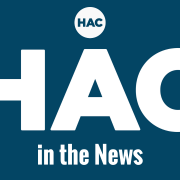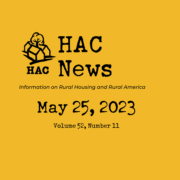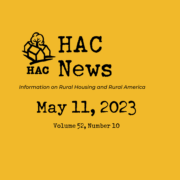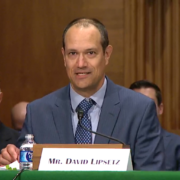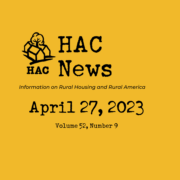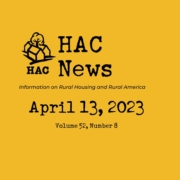TOP STORIES
House narrowly passes debt ceiling bill
By a 217-215 vote on April 26, the House passed the Limit, Save, Grow Act (H.R. 2811), which would raise the debt ceiling, cut federal spending, and rescind or repeal previously authorized spending. The bill is unlikely to pass the Senate, however, and the White House has said President Biden would veto it. USDA issued a press release quantifying possible impacts of the bill’s proposed cuts, including loss of rental assistance for up to 63,000 households and reduced support from the Rural Partners Network.
Senate committee considers rural housing
HAC CEO David Lipsetz is scheduled to testify on May 2 at a Rural Housing Legislation hearing before the Senate Banking Committee’s Housing, Transportation, and Community Development Subcommittee. The event will focus on a bill intended to improve several USDA rural housing programs, expected to be introduced by Senators Tina Smith (D-Minn.) and Mike Rounds (R-S.D.). Testimony at Building Consensus to Address Housing Challenges, a hearing before the full Senate Banking Committee on April 26, also recognized the distinct housing issues facing rural America.
HAC invites poster session proposals for national conference
Researchers and policymakers at all levels can apply by June 2 to share their research and innovative ideas through a series of poster sessions at the 2023 National Rural Housing Conference, October 24-27 in Washington, DC. The research must be related to rural America and can be on housing or another field such as public health, community development, race and ethnicity, or creative placemaking. Posters will be reviewed and judged by a distinguished panel of rural experts. For more information, contact Manda LaPorte and Natasha Moodie, HAC.
RuralSTAT
Nationally, shipments of new manufactured homes have eclipsed 100,000 for the past two years. In 2022 113,000 new manufactured homes were shipped. Source: Housing Assistance Council tabulations of HUD and the U.S. Census Bureau’s Manufactured Home Survey.
OPPORTUNITIES
Youth homelessness funding offered with rural priority
State, local, and Tribal governments, TDHEs, and nonprofits may apply by June 27 for the Youth Homelessness Demonstration Program, which supports communities in developing and implementing coordinated community approaches to preventing and ending homelessness among youth aged 24 and under. HUD will support projects in up to 25 communities, with a priority for up to eight with substantial rural populations. For more information, contact Caroline Crouse, HUD, 612-843-6451.
USDA opens Housing Preservation Grants competition
The Section 533 Housing Preservation Grants program funds state and local governments, Tribes, and nonprofits for repair or rehabilitation of housing owned or rented by low- and very low-income rural residents. Part of this year’s funding is set aside for repairs to units damaged in presidentially declared disasters in calendar year 2022. Applications are due June 5. For more information, contact a USDA RD State Office.
REGULATIONS AND FEDERAL AGENCIES
HUD requests input on disability-based discrimination
HUD is considering changes to its regulations for Section 504 of the Rehabilitation Act of 1973, which prohibits discrimination on the basis of disability in programs and activities receiving federal financial assistance. HUD wants to update its federal accessibility standard and clarify recipients’ obligations, including accounting for advances in accessible design, information and communication technology, and assistive technologies. Comments are due July 24. For more information, contact Amy Gioletti, HUD, 405-609-8561.
Fair housing, fair lending, and equitable finance rule proposed by FHFA
A proposed Federal Housing Finance Agency regulation would cover Equitable Housing Finance Plans for Fannie Mae and Freddie Mac as well as fair housing and fair lending for those entities and the Federal Home Loan Banks. Comments are due June 26. For more information, contact James Wylie, FHFA, 202-649-3209.
EPA releases framework for Greenhouse Gas Reduction Fund
EPA’s implementation framework divides the new $27 billion GGRF, created by the Inflation Reduction Act, into three competitions. The $14 billion National Clean Investment Fund will fund two or three national nonprofits to partner with private capital providers to deliver financing at scale to businesses, communities, community lenders, and others. The $6 billion Clean Communities Investment Accelerator competition will fund two to seven hub nonprofits to build the capacity of lenders such as CDFIs and housing finance agencies to finance clean technology projects. The $7 billion Solar for All competition will make grants to states, Tribal governments, municipalities, and nonprofits to prepare low-income and disadvantaged communities for residential and community solar. The agency will hold public listening sessions on this framework during the week of May 1. Comments can also be emailed to ggrf@epa.gov by May 12. EPA expects to issue Notices of Funding Opportunity as early as June.
USDA updates lender submission process for Section 538 guarantees
Changes for lenders submitting requests for rental housing guarantees under the Section 538 program will take effect on April 28, when USDA’s notice is published in the Federal Register. They include revisions to the priority criteria and the fee structure. For more information, contact Jonathan Bell, USDA, MFHprocessing1@usda.gov, 254-742-9764.
New comment deadline set for extending HUD’s Buy America waiver for Tribes
Comments are now due May 8 on HUD’s proposal to extend its waiver of Buy America requirements for Tribes and Tribal entities. For more information, contact Faith Rogers, HUD, 202-402-7082.
HUD announces rural-targeted funding awards
Following an earlier round of awards announced in February, the second set of communities receiving resources to address unsheltered and rural homelessness will get $171.2 million in grants for 115 new projects in 29 Continuums of Care, and approximately 3,300 Stability Vouchers will go to 139 PHAs that partnered with CoCs. Separately, HUD’s Older Adults Home Modification Program will provide $14.5 million to modify over 1,900 housing units, 1,100 of which are in “substantially rural” places, so that low-income elderly residents can remain in their homes.
HAC comments on Affirmatively Furthering Fair Housing
HAC submitted comments this month on a proposed HUD regulation that is intended to ensure that HUD and entities receiving funding from HUD will “Affirmatively Further Fair Housing.” In addition to supporting many aspects of HUD’s proposal and supporting suggestions made by other organizations, HAC wrote its own comment letter to address some specifically rural issues. HAC suggested that community engagement must be offered in many different ways, analyses must be conducted in smaller geographic areas, and data on USDA-supported housing must be specifically included.
EVENTS
Online placemaking conference set for May 23
USDA and the University of Kentucky will host an online conference May 23 on expanding access to placemaking resources for people in rural America. Rural leaders and placemaking experts will discuss ways to help advance placemaking strategies to create successful, thriving communities, as well as the importance of preserving and sustaining rural culture. Register here.
PUBLICATIONS AND MEDIA
Farm Bill may be opportunity to address rural rental preservation
Advocates Eye Farm Bill to Avert Drop in Affordable Rural Housing, a CQ Roll Call article, covers the anticipated loss of Section 515 rental units. HAC’s Director of Public Policy, Jonathan Harwitz, is quoted explaining legislative changes that could assist with preservation and could be adopted in the Farm Bill.
Report covers links between reentry and housing
The Council of State Governments Justice Center published Building Connections to Housing During Reentry, a report on a national survey of state Departments of Corrections highlighting connections between reentry after incarceration and housing.
HBO reports on farmworkers
A recent 25-minute segment on Last Week Tonight with John Oliver covers the working and living conditions of farmworkers in the U.S.
Rural placemaking article features CIRD
A Daily Yonder piece, Rural Renewal: Placemaking in Small Towns Through Good Design, describes the role of design and creative placemaking in building rural communities. It features the Citizens’ Institute on Rural Design (CIRD), a leadership initiative of the National Endowment for the Arts in partnership with HAC, and quotes Shonterria Charleston, HAC’s Director of Training and Technical Assistance.
Feedback sought on substance use recovery mapping tool
The Fletcher Group, Inc., NORC at the University of Chicago, and East Tennessee State University seek participants for virtual focus groups to provide feedback on the Recovery Ecosystem Index Mapping Tool. The system maps county-level factors that are in place to support individuals in recovery from substance use disorder.
Diversifying child population described
The Changing Child Population of the United States: First Data from the 2020 Census, published by the Annie E. Casey Foundation, reports that the U.S. child population is decreasing in size, increasing in diversity, and changing substantially. The nation’s child population fell from 74.2 million in 2010 to 73.1 million in 2020. Children of color, who represented just 26% of all kids in 1980, were a majority – 53% – in 2020. Data is presented at the state and city levels.
HAC
HAC is hiring a Chief Financial Officer
The Chief Financial Officer is a newly created position responsible for overseeing the accounting, finance, capital markets, and administrative functions of HAC, while also providing overall leadership and strategy to the organization. This executive must have a background in accounting or finance, managing staff, and serving as a senior leader at a sophisticated and multidimensional organization, such as another CDFI, community lending institution, or housing-related nonprofit. The CFO is expected to work in HAC’s downtown Washington, DC office with a portion of their week eligible for remote work.
National Rural Housing Conference set for October
Mark your calendars and save the date! HAC’s National Rural Housing Conference will be held October 24-27 in Washington, DC and online.
Need capital for your affordable housing project?
HAC’s loan fund provides low interest rate loans to support single- and multifamily affordable housing projects for low-income rural residents throughout the U.S. and territories. Capital is available for all types of affordable and mixed-income housing projects, including preservation, new development, farmworker, senior and veteran housing. HAC loan funds can be used for pre-development, site acquisition, site development, construction/rehabilitation and permanent financing. Contact HAC’s loan fund staff at hacloanfund@ruralhome.org, 202-842-8600.
Please note: HAC is not able to offer loans to individuals or families. Borrowers must be nonprofit or for-profit organizations or government entities (including tribes).
Want to reprint a HAC News item?
Please credit the HAC News and provide a link to HAC’s website. Thank you!


